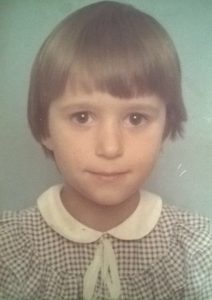

As I often get asked what inner child work is, how it works and what are the benefits, I decided to write about it.
And yep – that sad, scared, shy, boy-like kid on the pic is me……
No matter who we are and how old we are, where we are coming from and what we do for living, regardless of our childhood experiences, deep inside of all of us lives our INNER CHILD.
So he or she echoes our beliefs about ourselves and the world. Also, most of the time, they drive our emotions and unconscious behaviour. At home, at work, at the social gatherings and when we are alone with ourselves.
The inner child concept originates from Jung. It’s a part of our unconscious that represents the child we once were. And it has been widely used in psychotherapy as a powerful tool in helping with emotional healing and transformation.
In order for us to survive in our childhood and to avoid shame, in order for us to belong, get love, connection and everything else we need, we as children hide our traumatic experiences and / or emotions.
E.g. If we grew up with the controlling parent/s, we were taught to believe we were loved only if we were “good”. So we have learned to HIDE our rage, anger, sadness or any other negative emotion which got us in trouble.
And if we were physically or emotionally rejected, abandon or abused, we have mastered hiding our pain and fear so we don’t get hurt, rejected or abandoned again.
So this can get us into emotionally repressed cycles of self-sabotage in the adulthood where we run from one relationship to another “not to get hurt”, seeking parenting only to get more disappointed, rejected and abandon.
Inner child work can help us to tune in and feel ALL our emotions.
And it also creates a safe space to release, validate and accept all our emotions.
Because as adults we can be very hard on ourselves with our own self-judgement and loathing, which isn’t helping us to move on, connecting with our inner child is a perfect way to heal those childhood wounds.
So with taking care of the ‘child within’, we are finally honouring and taking care of our own needs as adults. And we are becoming ‘grown ups’.
As it’s not something that’s ‘done’ to us, but is something that we, as the adult, have some control over.
Who can benefit from inner child work?
Absolutely – E.V.E.R.Y.O.N.E!!! 😉
AND ESPECIALLY ANYONE WHO IS EXPERIENCING:
Relationship difficulties
Emotional numbness
Low self-esteem
Low self confidence
Powerlessness
Self-sabotage
Self-criticism
Self-doubt
Avoiding decision making
High sensitivity to criticism or a ‘feedback’
Lack of emotional intelligence
Anxiety
Codependency
Strong/ rigid independency
Depression
Passive aggressive behaviour
Abandonment issues
Fear of failure
Fear of success
Weight problems and obesity
Anger management issues
BPD
Strong recurring ‘negative’ reactions ( triggers )
Fears / phobias
Lack of courage and assertiveness
Being bullied / being a bully
Staying in a victim state
Staying in your head / ignoring the heart
‘Feeling like a fraud who is about to be exposed’
Anyone who has experienced sexual, physical, emotional abuse or neglect
How can Inner Child Work help resolving those issues and heal those wounds?
- Via accessing repressed memories which are holding us back
- Seeing, hearing, feeling, accepting and validating those memories, our trauma and our negative beliefs, emotions and feelings
- Starting to FEEL AGAIN after years of being numb – feeling passion inside instead of emptiness
- Gaining personal power and the ability to set boundaries
- Learning how to love and take care of ourselves
- Being calmer and emotionally stronger / smarter
- Learning self-acceptance and self-compassion
- Gaining self-confidence
- Having fun, enjoying playful banter and humour in our relationships
- Gaining and practicing natural creativity accessing new ideas easily and effortlessly
- Being able to deeply connect with ourselves and to see the bigger picture and get a vision
- Developing / strengthening our intuition
- Being there for ourselves and for the others, listening and learning about our own needs and needs of others
- Living in the heart, being more soft, modest and humble
- Living authentically, being true to ourselves
Are you ready to conquer your mountain?

